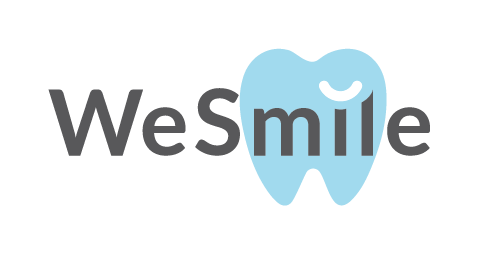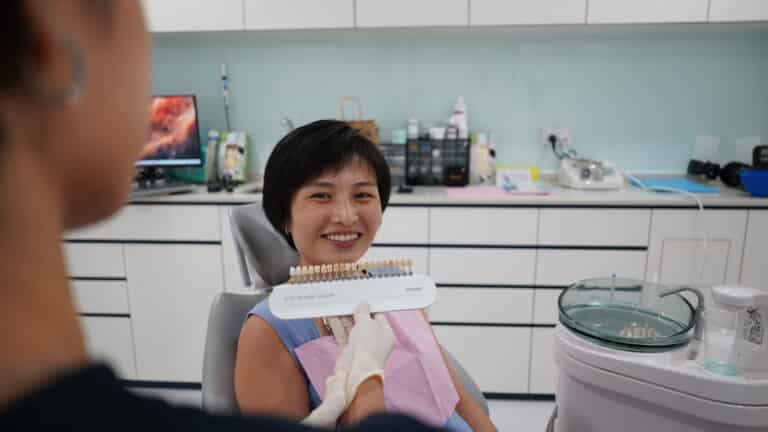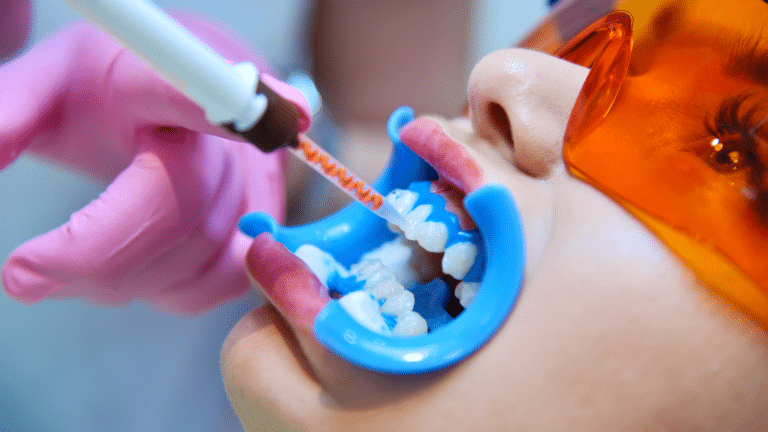A beautiful smile is more than just an aesthetic feature; it’s a reflection of your oral health and overall well-being. While brushing and flossing are essential habits in maintaining good oral hygiene, many people overlook the power of mouthwash. It’s not just about fresh breath; mouthwash can be a vital component of ensuring your teeth and gums remain healthy for the long term.
In this guide, we’ll explore how mouthwash can enhance your daily oral care routine, the various types available, and how it can contribute to a healthier, more vibrant smile.
Why Mouthwash Should Be a Part of Your Daily Routine
When you think of mouthwash, you might just associate it with a quick fix for bad breath. However, mouthwash offers far more than that. It’s a powerful tool that can:
- Eliminate harmful bacteria: Mouthwash helps reduce bacteria that contribute to
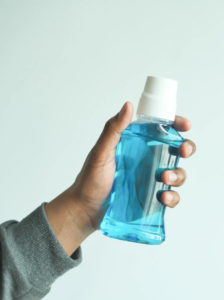
Person holding a mouthwash bad breath, cavities, and gum disease.
- Strengthen tooth enamel: Mouthwash can protect and remineralise tooth enamel, helping to prevent decay.
- Reduce plaque buildup: It slows down plaque accumulation, which can eventually lead to tartar if not properly managed.
- Soothe oral discomfort: Some mouthwashes can provide relief from mouth ulcers, sore throats, and gum inflammation.
- Provide additional protection: Mouthwash can reach areas your toothbrush and floss may miss, offering added defence for your mouth.
While brushing and flossing remain the foundation of your oral hygiene routine, mouthwash provides an additional layer of protection.
Choosing the best Mouthwash for Your Needs
Not all mouthwashes are the same, and the right one for you depends on your specific oral health needs. Here’s a look at the most common types of mouthwash:
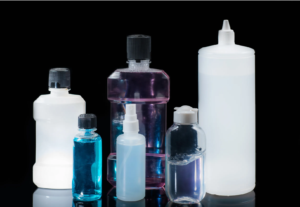
Type of Mouthwash |
Best For |
Key Features |
|---|---|---|
Fluoride Mouthwash |
Cavity prevention | Strengthens tooth enamel, helps remineralise teeth, and prevents decay. |
Antiseptic Mouthwash |
Killing germs, preventing infections | Contains antibacterial agents (e.g., chlorhexidine or alcohol) to treat gingivitis and bad breath. |
Alcohol-Free Mouthwash |
Sensitive mouths, dry mouth (xerostomia) | Gentle formula without alcohol, ideal for children or those with sensitive mouths. |
Cosmetic Mouthwash |
Freshening breath | Provides temporary fresh breath, masking bad breath with flavours like mint or cinnamon. |
Specialised Mouthwash |
Specific oral health issues (e.g., gum disease, whitening) | Targeted formulas for conditions like gum disease, post-surgery care, or teeth whitening. |
If you’re unsure which type of mouthwash is best for you, it’s always advisable to consult your dentist for personalised recommendations.
Mouthwash vs. Brushing and Flossing: Can Mouthwash Replace Them?
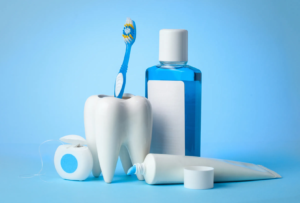
Mouthwash is an essential supplement to brushing and flossing, not a replacement. Here’s why:
- Mouthwash cannot remove food particles or plaque the way brushing and flossing can.
- It does not replace mechanical cleaning, meaning you still need to brush and floss to thoroughly remove plaque.
- However, mouthwash reaches areas that brushing and flossing might miss, such as the back of the throat and between teeth.
- It provides additional protection against bacteria, cavities, and gum disease.
Think of mouthwash as the final step in your oral hygiene routine, enhancing what you already do with brushing and flossing.
How to Use Mouthwash for Maximum Benefits
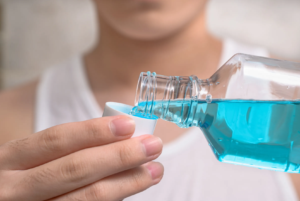
To get the most out of your mouthwash, follow these simple steps:
- Brush and floss first: Mouthwash is more effective after your mouth is clean.
- Measure the right amount: Use about 20ml (roughly 4 teaspoons) per use.
- Swish for 30-60 seconds: Swishing for a shorter time won’t allow the active ingredients to work fully.
- Gargle for additional throat protection: Tilt your head back slightly and gargle to kill bacteria in your throat.
- Avoid rinsing with water afterward: Don’t wash away the active ingredients by rinsing with water.
- Wait 30 minutes before eating or drinking: This ensures the mouthwash can continue working effectively.
Popular Mouthwash Brands to Consider
Once you know what type of mouthwash suits your needs, the next question is: Which brand should you go for? With so many options available, it helps to understand what each brand brings to the table. Here are some popular mouthwash brands in Singapore and what makes them worth trying:
Listerine Mouthwash – For a Powerful, All-Round Clean
Listerine is a well-known name in oral care and offers a wide range of mouthwashes targeting different concerns—from tartar control to gum protection and whitening. It is recommended to speak with your dentist to understand your oral health concerns before deciding on the type of mouthwash.
Colgate Plax Mouthwash – Gentle Yet Effective
Colgate Plax is designed for a gentler mouthwash experience. Many variants are alcohol-free, making them suitable for sensitive gums or dry mouth. This mouthwash includesfluoride, which is a naturally occurring mineral that helps strengthen enamel while offering protection against cavities. These ingredients aim to provide effective oral care without the harshness of traditional mouthwashes.

Systema Mouthwash – Great for Sensitive Gums
Systema offers gentle, low-irritation mouthwash options—ideal if you experience gum sensitivity. Their formulas are usually alcohol-free and are designed to protect against gum problems while being kind to your mouth.
Oral-B Mouthwash – Backed by Dentists
Oral-B mouthwashes are often formulated with dentist-approved ingredients like cetylpyridinium chloride (CPC) or fluoride. These ingredients are great for strengthening enamel and targeting bacteria, all while being gentle on soft tissues.
How Professionals at WeSmile Dental Can Help
While mouthwash is an important tool for oral hygiene, regular dental check-ups and professional cleanings are essential to maintaining long-term oral health. At WeSmile Dental, we offer a variety of services to help you maintain a healthy, bright smile.
One of our most popular services is scaling and polishing, a professional cleaning procedure that helps remove plaque and tartar buildup from your teeth. Over time, plaque can harden into tartar, which can only be removed through professional cleaning. Scaling and polishing not only enhance the appearance of your teeth but also promote better oral health by:
- Removing plaque and tartar: Helps prevent gum disease, cavities, and bad breath.
- Polishing teeth: Leaves your teeth looking clean and bright.
- Preventing further buildup: Helps maintain your oral hygiene in between dental visits.
Find more information on our scaling and polishing services and pricing here.
Book an Appointment with WeSmile Dental Today!
Are you ready to take the next step towards better oral health? Book an appointment with WeSmile Dental today, and let our expert team guide you on the best practices for maintaining your smile.
FAQs: Everything You Need to Know About Mouthwash
1. Does mouthwash really work?
Yes! Mouthwash is effective in reducing bacteria, freshening breath, and helping to prevent cavities. However, it should be used in addition to brushing and flossing, not as a replacement.
2. Is mouthwash acidic or alkaline?
Most mouthwashes are slightly acidic to help eliminate bacteria. Some fluoride-based mouthwashes are more neutral to protect enamel. If you have sensitive teeth, consider using a pH-balanced mouthwash.
3. Should I use mouthwash after eating sweets?
Yes! After eating sugary foods, mouthwash can help wash away residual sugars and neutralise acids, reducing the risk of cavities. Fluoride mouthwash is ideal for protecting enamel.
4. Can we swallow mouthwash?
No! Mouthwash is designed to be spit out after use. Swallowing small amounts can cause stomach discomfort and may be harmful due to the ingredients. If a child accidentally swallows mouthwash, seek medical advice immediately.
